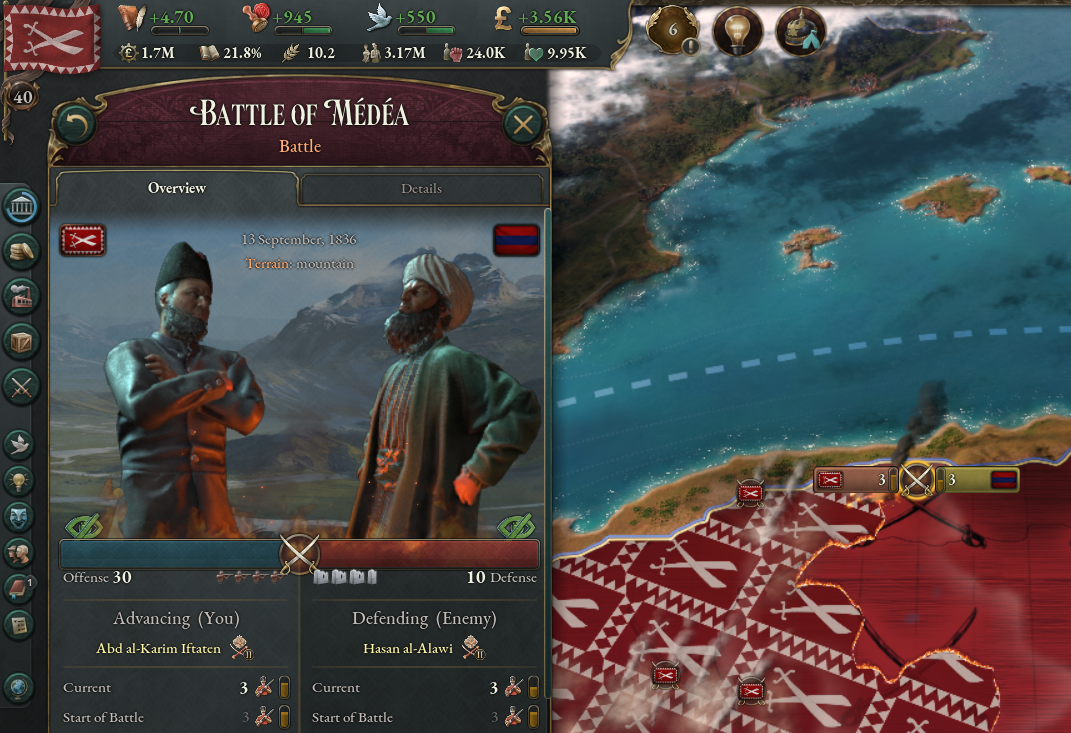.jpg)
Ave and welcome to another Dev Diary! Today I will be talking about how Battles work and what their consequences are. If you haven't already, I suggest you first read through the dev diary on Fronts and get acquainted with the concepts explained there.
Let's start off with a somewhat updated version of the Front panel. Do note that this is all still very much WIP and not all values are hooked in, balanced or polished. For example at the moment there are a lot more deaths in battles than there should be.
Who could’ve seen this war coming?

In order for a battle to happen one side must have at least one General with an Advance order. Once this happens an advancement meter will slowly start to fill up and once it’s full a new battle will be launched. Various factors can increase or decrease the time it takes.
When the battle is created a sequence of actions unfolds before the fighting begins. All of these are in script and can be tweaked by mods as desired.
- The attacker picks their leading General
- The defender picks their leading General
- The battle province is determined along the frontline
- The attacker determines the number of units they can bring
- The defender determines the number of units they can bring
- Both sides selects their units
In addition each side randomizes a Battle Condition which provides bonuses (or penalties) to their units similar to Combat Tactics in Hearts of Iron 4. Unlike HOI4 though these are fixed for the duration of the battle. For example a General with the Engineer trait has a higher chance of selecting the “Dug In” Battle Condition which provides defensive modifiers.
Königgrätz anyone?

Now the shooting (and dying) finally starts! The battle takes place over a number of rounds and will continue until one side is either wiped out or retreats. The round sequence is roughly as follows:
- Each side determines how many fighting-capable men it still has
- Each side inflicts casualties on the other side
- Each side attempts to recover wounded casualties
- Each side also suffers morale damage according to casualties
- If one side is wiped or retreats, the battle ends
Units have two primary combat values: Offense is used when attacking and Defense is used when defending. It is wise to plan ahead and specialize your armies for the war you are planning to fight. There are of course a whole bunch of additional modifiers used in conjunction with battles.
Crack open the fortress of Liège!

Casualties are determined by both sheer numbers and the relative combat stats between the two sides. For example a numerically inferior force equipped with more modern weapons may still emerge victorious against a larger foe.
When a side takes casualties it is randomly distributed amongst its units with some caveats.
Each unit has a majority culture depending on the pops in its barracks and casualties are applied roughly in proportion to unit culture. So with 4 French/1 Flemish units fighting on the same side the French will take roughly 80% of the casualties.
Not all pops who take casualties will end up dead though. A portion of these may instead end up as Dependents of other pops. After a long bloody war a nation may thus end up with a large number of wounded war-veterans who need to be supported by the rest of the population. In the long term this may be a cause of unrest and financial strain on the economy.
Morale damage is inflicted in proportion to the casualties and will slowly recover over time outside of battles presuming the units are in good supply.
One step closer to Unification

After the battle is over two things will happen:
A number of provinces are Captured depending on how decisive the victory was, unit characteristics, Generals, etc. This will alter the frontline and the winner will occupy those provinces until retaken or the end of the war.
A victorious defender will only take back land that was previously lost to the enemy while a victorious attacker will push into enemy land and take control of more provinces owing to their aggressive posture.
Devastation is also inflicted on the State in which the battle was fought. Large, brutal battles waged with modern weaponry will increase the devastation caused. It reduces infrastructure and building throughput, increases mortality and causes emigration. These effects persist after the war and will take quite some time to recover.
That’s it for this week! Next week we switch over to the political battlefield and discuss Elections! *ducks back into the trenches*



